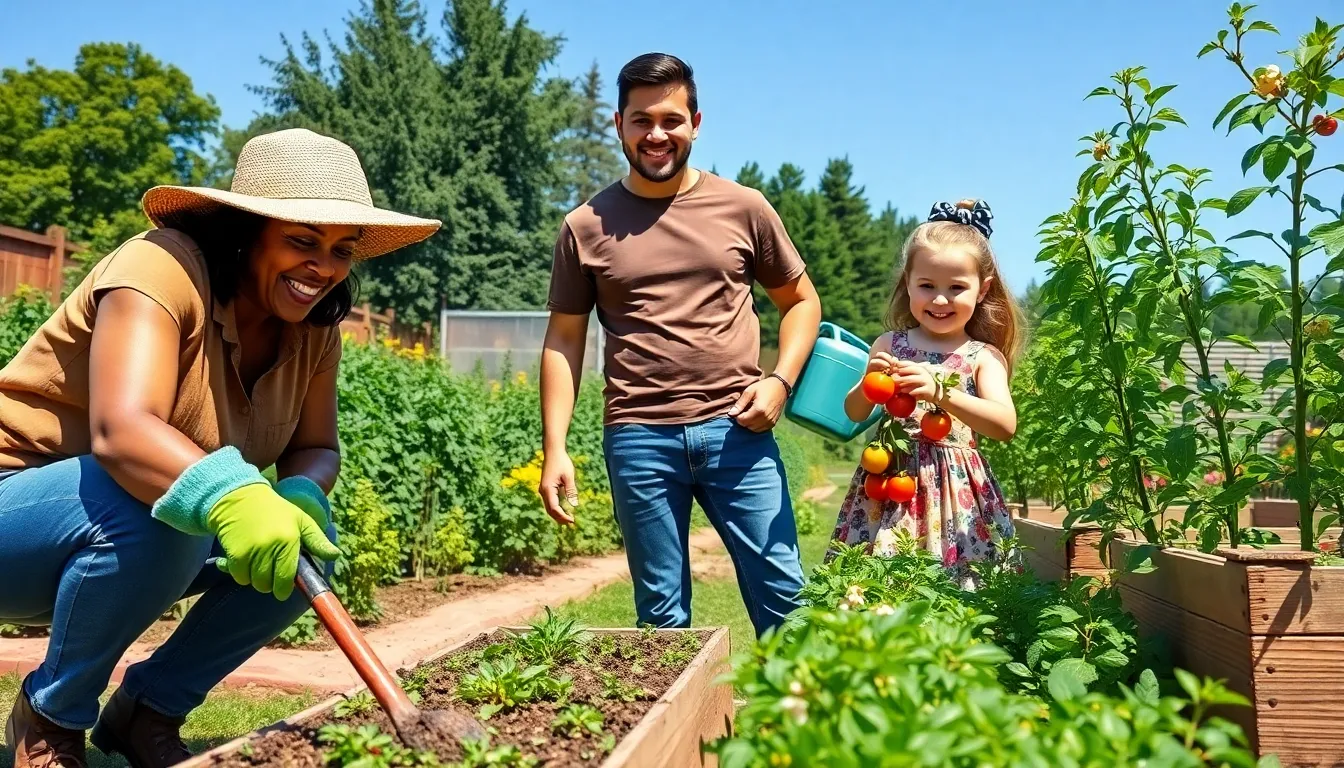In a world where plastic bags seem to multiply like rabbits and climate change feels like an unwelcome houseguest, sustainable living isn’t just a trendy hashtag—it’s a necessity. Imagine a life where you can sip your morning coffee guilt-free, knowing you’re not contributing to the planet’s meltdown. Sounds dreamy, right? Well, it’s time to wake up and smell the organic coffee because sustainable living is all about making choices that protect our planet for future generations.
Sustainability isn’t just for tree-huggers and eco-warriors; it’s for everyone who wants to enjoy clean air, fresh water, and a planet that doesn’t resemble a sci-fi disaster movie. By embracing sustainable practices, individuals can reduce their carbon footprint and promote a healthier lifestyle. So, let’s dive into why living sustainably is not just important but downright essential for a thriving future.
Table of Contents
ToggleUnderstanding Sustainable Living
Sustainable living encompasses practices that minimize environmental impact and promote resource conservation. It involves making conscious choices about consumption, energy use, and waste management. Individuals play a key role by opting for products that support sustainability, such as organic foods and eco-friendly items.
Reducing waste significantly contributes to sustainability. For instance, recycling materials like paper, plastics, and metals helps decrease landfill use and conserves natural resources. Composting organic waste nurtures soil health while lowering methane emissions from landfills.
Energy efficiency also factors into sustainable living. Using LED lights, energy-efficient appliances, and renewable energy sources, such as solar panels, reduces overall energy consumption. Individuals can save money on utility bills while decreasing their carbon footprint.
Transportation choices impact sustainability as well. Walking, biking, and using public transport lowers greenhouse gas emissions compared to driving. Carpooling and choosing electric vehicles further minimize carbon footprints, fostering cleaner air quality.
Water conservation remains crucial for sustainable living. Simple actions like fixing leaks, using water-efficient fixtures, and collecting rainwater can reduce water usage. Managing aquatic resources ensures their availability for future generations.
Engaging local communities promotes sustainability initiatives. Community gardens, local farmer’s markets, and clean-up events inspire collective action towards a greener environment. Supporting local businesses strengthens local economies and reduces transportation emissions.
Every individual contributes to a much larger movement through sustainable living practices. Lifestyle choices today can shape a more sustainable future for subsequent generations. Making informed decisions fosters a healthier, more viable planet for all stakeholders involved.
Environmental Benefits

Sustainable living significantly contributes to environmental health. By adopting eco-friendly practices, individuals can play a crucial role in reducing greenhouse gas emissions, minimizing the impact on global warming.
Reducing Carbon Footprint
Reducing carbon footprints directly affects climate change mitigation. Individuals can lower their carbon emissions by opting for public transport, biking, or walking instead of driving. Implementing energy-efficient appliances at home also leads to lower electricity consumption. When people choose renewable energy sources like solar or wind, they further decrease reliance on fossil fuels. One example includes installing solar panels, which can result in substantial energy savings over the lifespan of the system. Every small action cumulatively makes a significant difference, illustrating how lifestyle choices directly influence carbon output.
Preserving Natural Resources
Preserving natural resources is essential for maintaining ecological balance. Sustainable living practices focus on conserving water through mindful usage, such as fixing leaks and using water-saving fixtures. Implementing recycling and composting initiatives helps divert waste from landfills, effectively conserving material resources. By supporting local agriculture, individuals reduce the need for transportation, lessening resource depletion and pollution. Choosing products with minimal packaging can also contribute to resource preservation, since it reduces the demand for manufacturing and disposal. Overall, such conscious actions lead to a healthier environment, vital for future generations.
Economic Advantages
Sustainable living offers significant economic advantages. Individuals can find various financial benefits while contributing to environmental health.
Cost Savings
Cost savings emerge through reduced energy consumption. Installing energy-efficient appliances, using LED lighting and leveraging renewable energy can significantly lower monthly utility bills. Opting for public transportation or carpooling decreases fuel expenses. Furthermore, minimizing waste through recycling and composting leads to savings on waste disposal fees. Those who grow their own food save on groceries, all while encouraging healthier eating habits. Together, these practices not only protect resources but also alleviate financial burdens.
Job Creation in Green Industries
Job creation flourishes within green industries. As businesses adopt sustainable practices, they generate demand for skilled workers in areas like renewable energy, waste management, and sustainable agriculture. The solar and wind energy sectors, for instance, employ thousands of individuals. Growth in local food systems also opens opportunities for farmers, distributors, and retailers focused on sustainability. Overall, investing in sustainable practices stimulates the economy while addressing environmental challenges.
Social Impacts
Sustainable living significantly influences social structures and community dynamics. Prioritizing eco-friendly practices enhances community well-being and fosters social cohesion.
Community Well-Being
Engagement in sustainable initiatives, such as community gardens, creates interactive spaces for residents. These gardens promote social interaction, cultivate friendships, and build a sense of belonging among neighbors. Participation in local farmer’s markets also strengthens bonds, as individuals share locally sourced products while supporting regional economies. Community involvement encourages collaboration towards common environmental goals, fostering unity through shared values. Ultimately, sustainable living practices contribute to resilient, thriving communities.
Health and Safety Improvements
Health benefits arise from sustainable practices that enhance the environment. Access to green spaces, essential for mental and physical well-being, positively influences quality of life. Sustainable transportation choices, like biking or walking, reduce air pollution, leading to fewer respiratory issues among residents. Clean energy sources decrease reliance on fossil fuels, minimizing safety hazards associated with traditional energy production. Communities embracing sustainability often report better overall public health outcomes, suggesting a direct link between eco-conscious behaviors and improved well-being.
Personal Responsibility
Personal responsibility plays a crucial role in sustainable living, as individual actions directly impact the environment. Each choice made today influences the planet’s future.
Making Conscious Choices
Conscious choices form the backbone of sustainable living. Individuals prioritize reducing waste by recycling and composting, which lessens landfill contributions. Utilizing energy-efficient appliances further minimizes energy consumption. Sustainable transportation options, including biking and walking, reduce reliance on fossil fuels, enhancing community health. When prioritizing local products, people support regional economies and encourage sustainable agriculture. Embracing these practices can lead to more mindful consumption.
Role of Education and Awareness
Education and awareness drive the shift toward sustainable living. Informing communities about environmental issues spurs proactive choices. Schools and organizations contribute to this knowledge through workshops and outreach programs. Greater awareness translates to increased participation in sustainability initiatives, such as community gardens and clean-ups. People equipped with information feel empowered to adopt eco-friendly behaviors, influencing peers and fostering collective action. Ultimately, informed individuals make a significant difference in their communities and the environment.
Sustainable living is essential for creating a healthier planet and ensuring a better quality of life for future generations. By making conscious choices and adopting eco-friendly practices, individuals can significantly reduce their environmental impact. This commitment not only benefits the Earth but also fosters stronger communities and promotes economic growth.
As more people embrace sustainability, the collective effort leads to a cleaner environment and improved public health. Ultimately, the journey toward sustainable living is a shared responsibility that empowers everyone to contribute to a brighter and more sustainable future.






